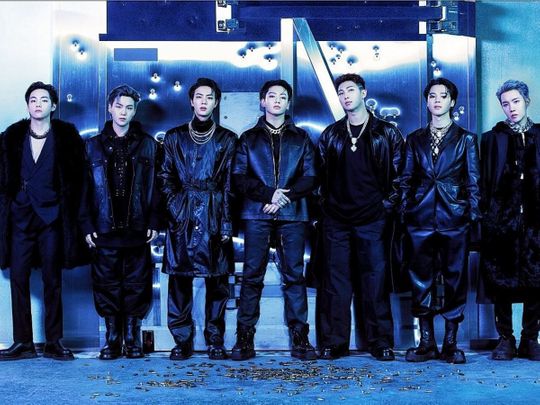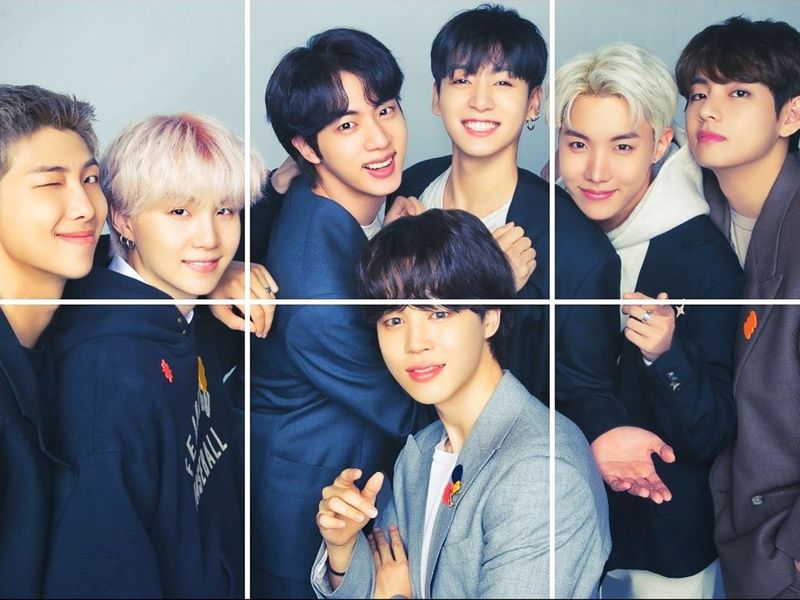
When you think you’re going to crash, keep accelerating. Those are BTS’ Suga’s words.
It was the band’s motto in their early years. It’s the manic energy that bubbled in their 2013 debut song, No More Dream, which now incidentally seems like a fever dream. It’s the same energy they brought to Run BTS, their last performance in Busan 2022, before they announced their military enlistment. The truth is, BTS has always been filled with ‘chaotic’ energy, as their fan-base ARMY proudly says.
BTS is chaos, and chaos is BTS.
It has been 10 years of this chaos that got half the world in an iron grip. The story of RM, Jin, J-Hope, Suga, Jimin, V and Jungkook is one for the books. The truth is, it is now. Their journey has been enshrined in their 10th anniversary book, BTS: Beyond The story.
For those of us who have followed them from the beginning, we’ve seen a lot. We have seen them rage on stage with the Cypher tracks, tear up at the thought of winning a grand prize and laugh through those tears. We’ve watched them fight over food, choose food over their albums, throw each other into pools, do laundry, and even fall asleep on Weverse Live. It’s almost a parasocial relationship.
These boys have come a long way from their heavily lined eyes, trademark chains and vests, and shorts. In the past decade, they’ve dyed their hair multiple times, charted the Billboards individually and as a team, and represent top-tier fashion brands. Yet for their fans, BTS represents so much more than that. And this is what the book attempts to capture. It wants to go beyond the story. But does it?

For a person who isn’t so involved with BTS, the book is a treasured, valuable insight into the lives of the most popular global stars. It’s a classic tale of rags-to-riches, from working in tiny studios, seven people sleeping in one dormitory, battling hatred, trolls and cruel accusations, discrimination in foreign lands, to now owning plush apartments in South Korea and raging on Billboard charts. There’s detailed explanations, analyses behind all the songs, and how each iconic track was a reflection of their mindset at the time. For instance, Jimin scoffed at the initial version of DNA and told the chairperson no less, that he didn’t like it. And, it was changed. The book takes you through their excruciatingly painful days of rejection, hurt and anger. It shows how anxiety and panic almost took hold over them as they were constantly mocked and bullied publicly.

Yet, the book, quite often misses the sassiness and spice of BTS, that ARMY has grown to love. BTS might not have responded directly to trolling or haters, but they had their own snarky ways of handling haters. While addressing the cyber-bullying that the band faced, it’s a pity the book didn’t explain how Suga shut down haters at a concert after accusations of lip-syncing. The rapper had stopped in the middle of the track Mic Drop, with an inexplicable smirk. RM in countless interviews has shut down pointless questions, especially the ‘dream’ of working with Justin Bieber. “It’s a not a dream. We’re company friends,” he had shot back.
That’s the BTS snark. It’s this spark that endears them so much to their fans, and sadly, this particular flavour is missing from the book.
Beyond the Story is a clean, enjoyable read, don’t get me wrong. It brings out the evolving personalities of the seven clearly, the angst of Suga, the ever-impressionable V and Jungkook losing their youth in the world of idol training, and a young leader RM, struggling to steer the band in the right direction. However, this isn’t quite novel information, because over the years, the members have often spoke about those days and their journey to peace with it. What is new and delightful, is how each member joined BTS. With RM, J-Hope and Suga taking the reigns, ‘doe-eyed’ Jungkook was the next to join. In his typical unassuming way, Jungkook plaintively says that he didn’t know why earlier companies wanted to sign him.
He was even invited to a hotel room; you can hear the polite confusion in his words as he recalls the experience. Yet, Big Hit beat everyone, as Jungkook’s fan-boy obsession for RM had already taken form, as he had seen his videos on YouTube. “Hyung’s rap was great and his English was so impressive, so I decided, this is where I’ll go”- you can hear the joy in Jungkook’s words. This strong affection has just trebled over the years, to the point it’s almost an affectionate joke between BTS and ARMY.
On the other hand, V begins his tale by plunging into grievance at the start. His journey to BTS began by getting cheated by the cab driver. Ironically, he hadn’t even intended to audition at all, but somehow tumbled into this world of music and practices. Jin was fooled, as he says. He was told that he would become an actor. Instead, he had to train to become an idol. These little introductory tales make for a breezy read; it takes you back to their pre-debut days, before it all began.
Yet, though it is mentioned innumerable times throughout that BTS had only each other, many incidents that are part of their lore, do not make it to the book. BTS is more than their music for their fans; it’s their brotherhood that has been overwhelming element for their fans. Each of them have such a different relationship with each other, which has always been the focus of their variety shows, Run BTS, In the Soop and Bon Voyage. This is what brings them closer to their fans. They feel real, and far more accessible.
The book has painstakingly explained their exhaustion, misery and hurt, and crippling thoughts of disbandment. Yet, It doesn’t mention how exactly they got each other through those times. ARMY knows a lot more, owing to the barrage of videos BTS had themselves shared over the years. A tearful Jungkook had hugged, begged J-Hope to stay, when he wanted to quit. None of their fights, barring the dumpling argument between V and Jimin is mentioned, which was symbolic of how exhausted and burnt out the former was. What about the time Jimin and Jungkook had a K-drama like reconciliation in the rain? What about when J-Hope hit Jungkook with the banana? Or when Jin and V fought right before a concert and RM went to comfort both of them, proving that he truly is a leader of the septet? These little rows, spats and fights are intervals between the overwhelming brotherhood and it brought them closer, and brought ARMY close to them. It’s what makes BTS, BTS.
In short, it’s not quite beyond the story of BTS. It’s a pleasant and fun read, but stays at the edges. However, all said and done, for those who followed the boys years after their debut, these memories almost feel like the band’s melancholy Spring Day (2017), a wistful track about missing old friends. It might be a while till they all perform again, but till then, it feels pleasant to return to the past when they were all together.











